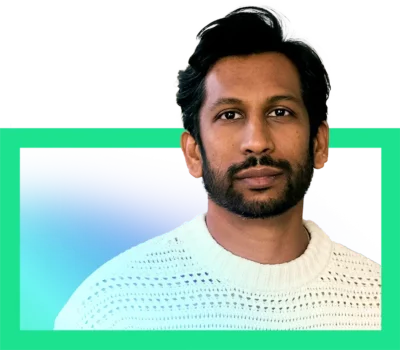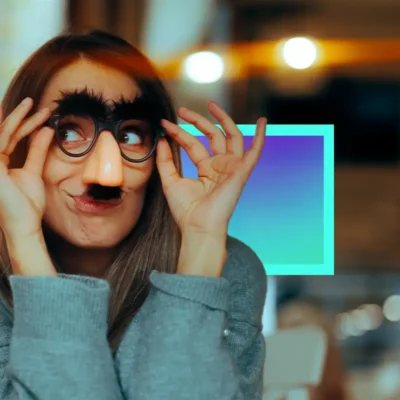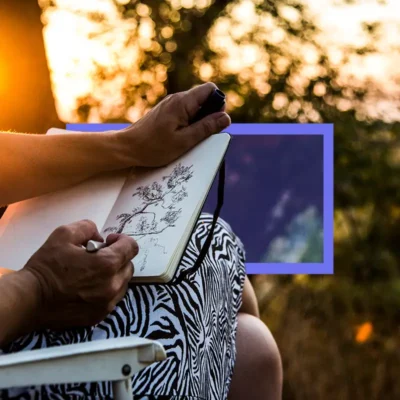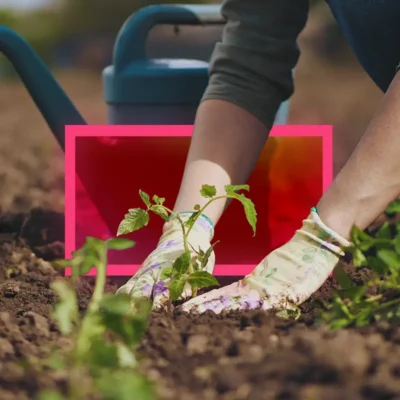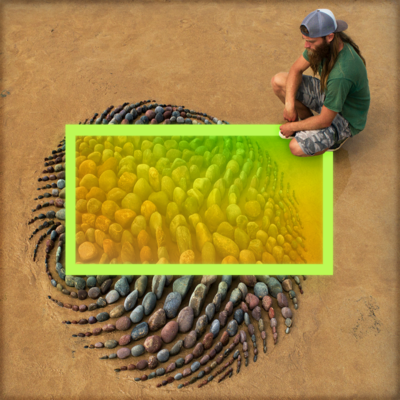Giving myself permission to create
On his podcast and TV show Song Exploder, Hrishikesh Hirway digs deep into the creative process of legendary songwriters. But before Hrishikesh becomes a podcast creator, he’s a working musician himself … who finds his ability to create being slowly drained away by self-doubt. He stumbles into a case of songwriter’s block that lasts him nearly seven years. Today, Hrishikesh shares the story of how he gets drawn back into creating music through an unexpected collaboration.
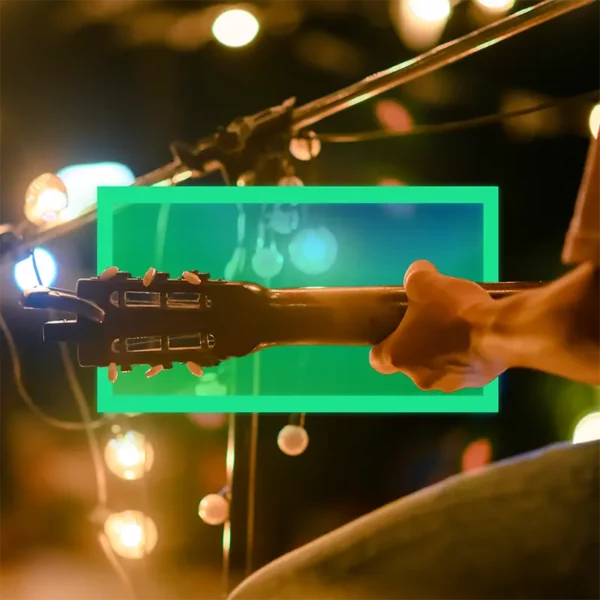
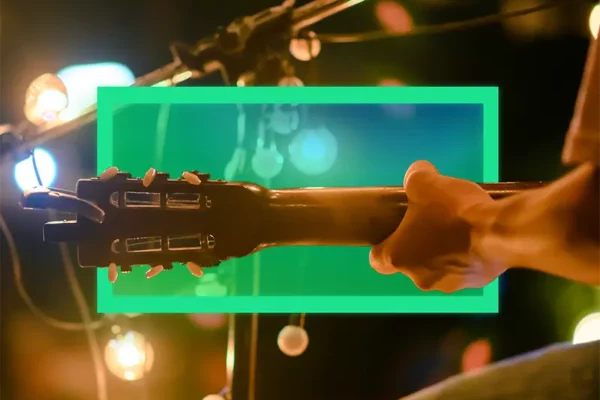
Table of Contents:
Transcript:
Giving myself permission to create
HRISHIKESH HIRWAY: I spot an open Friday in November, and I slash it out completely on the calendar. And then I slash out all the Fridays. No more excuses. Friday is going to become my day for music. A songwriting day. I’ll wake up and ignore everything else. It sounds extreme to me, but nothing else has worked before. A new feeling of determination takes hold.
ROHAN GUNATILLAKE: You might know Hrishikesh Hirway as the creator of Song Exploder, which is an incredible podcast where musicians talk through the creation of a particular song of theirs. There’s also a TV version of it on Netflix, and the episode where Michael Stipe of REM talks about the song “Losing My Religion” is genuinely one of the greatest things I’ve ever seen about the creative process. But before Hrishi becomes a podcast creator, he’s a working musician who finds his ability to create being slowly drained away by self-doubt. He stumbles into a case of songwriter’s block that lasts him nearly seven years. Today, Hrishi shares the story of how he gets drawn back into creating music through an unexpected collaboration.
In this series, we combine immersive first-person stories, breathtaking music, and mindfulness prompts so that we may see our lives reflected back to us in other people’s stories. And that can lead to improvements in our own inner lives.
From WaitWhat, this is Meditative Story. I’m Rohan, and I’ll be your guide.
The body relaxed. The body breathing. Your senses open. Your mind open. Meeting the world.
HIRWAY: I close the back door to my house and take the short walk to my recording studio. It’s just 25 feet, connected by concrete pavers that span from one door to the other. That’s the advantage of using my garage as the place I record. As I move away from the house, I start to shed my daily worries, my obligations. What’s left? The feeling that I want to create something.
I enter the studio and step across the dark wood floors. The space is tidy. It’s full of little shelves and drawers where everything is put away and labeled. Four of my guitars are mounted on a wooden rack on one side; a mandolin and a xylophone hang across the room. This space is my laboratory.
Next to the guitars, on the white wall, there’s a portrait of WB Yeats, my favorite poet, by the painter John Singer Sargent. In any space I’ve worked in, over the last 20 years, this portrait’s been with me. Above the upright piano are two framed posters from my last tour with my band.
The morning light shines through the window above my desk. It casts the room in a cool blue-gray.
It’s pretty tight quarters. Minimal. But cozy. It’s a reflection of me.
Sitting in the studio, I’m transported back to 2007. Seven years after graduating college. I’ve become a full-time musician, finally. Paying my bills through my music feels like a massive accomplishment. I’ve crossed the goal line. I think it’ll feel great, forever.
But the deeper I get into the music industry, the more my perception of my own success changes. Earlier, it had been easy for me to separate how good something is from how commercially popular it is. But now, the difference blurs. I see up close how different artists are treated, how resources are allocated to them, and I’m unable to escape the idea that commercial success just means better.
Sure, I sometimes get letters from fans who tell me that my music is important to them, or that it helped them in some way, but things aren’t happening for me at the kind of scale I witness for some of my peers who are blowing up and selling out huge shows.
It makes me feel like I need to change the way that I make music. It makes me feel like I need to change what I value about music.
In 2011, I release one more full-length album. And then I stop making my own music altogether.
I keep going to my studio, but when I do, each time I try to play a chord progression or a melody — it quickly spirals into, “Why am I even trying? Is this song going to be good enough to pay my rent? There are so many artists who are so much more accomplished and popular, who can probably do a better version.” I strum an A minor on my guitar, and I think, “For 10 years you’ve been starting songs on A minor. God, be original. Who am I fooling? What’s the hubris that makes me think I should even bother? Who am I to try?” I feel embarrassed. I quickly drag any file I record into my computer’s trash.
I get writer’s block. Seven years go by. It’s so long, I worry it might be permanent.
It’s December, 2013. Wintertime in LA, which doesn’t really feel like winter. And I’m in Little Tokyo with a new friend, looking for spoons.
Amit and I met just a few weeks ago at a Day of the Dead party. I don’t usually run into too many other Indian people in LA. I think it’s the same for Amit. We find it easy to have a conversation immediately, and make plans to hang out. And so tonight, we meet up.
The street lights are already on, the air around us glowing amber. Amit and I zigzag in and out of different shops on a mission to find the perfect ramen spoons for my wife for Christmas. It’s not a chore; I love shopping for presents, finding just the right thing for the people I love.
Amit is a fast walker. As we walk, I tell him about a podcast I’m about to start making, called Song Exploder — where a musician takes apart one of their songs, and tells the story behind its creative process. Amit has lots of questions about the show, and I’m able to tell him about it, without analyzing my own answers. He tells me about the business he’s building. As we’re walking and talking, a velocity builds as the ideas volley back and forth. One of us says something, and the other receives the idea and says: “yes, and…” — like improv comics building a scene. I’m excited about diving into the songwriting process of others, even as I struggle with my own. I believe in the idea, so it feels like I have permission to birth something new.
We end up at Marukai Market. It’s somewhere between a grocery store, a convenience store, and a Target. They have food, but also dishware and pots and pans. As we talk, I see them — four ceramic ramen spoons in a nice little box, perfect for a present.
In this moment, I’m struck by an overwhelming feeling of anticipation. It’s the feeling I get when the holidays approach, combined with the thought of this new project launching in a few short weeks. The moment feels full of possibility.
GUNATILLAKE: Let your attention lean forward. The spine, upright. This moment is full of possibility. What happens next might just be the most important thing.
HIRWAY: Once Song Exploder arrives in the world, it finds an audience. It starts to take off. We even make it into a TV series. The point of the show is to honor the creative process of others. I feel the irony. I don’t think my own songs merit the same kind of reverence. The moment I have a songwriting instinct, I instantly negate it. The negation happens so quickly — within a split second — that the two thoughts almost feel like one thought. But they aren’t. They are two separate synapses that fire, making an electrical circuit. “I have this idea.” “I hate this idea.”
In 2018, Jenny Owen Youngs sits on the floor of my studio, knees tucked underneath her, disregarding the couch. She places a yellow notepad in front of her and rests her acoustic guitar in her lap. As she tunes, she talks to me about astrology. She talks to my dog, who wanders into the studio to observe. She’s so comfortable. Her warm, buzzy energy puts me at ease.
Jenny’s a singer-songwriter with a lot of credits under her belt. She also co-hosts a podcast about the TV show, Buffy, The Vampire Slayer. One day she and her co-host hear me mention on my own podcast how Buffy’s a series I’m now watching for the first time. I accept her invitation to be a guest on her show. I have a great time. As part of the podcast, Jenny writes an original song for each episode, which to me is wildly prolific.
About eight months later, out of the blue, I get an email from Jenny. “Hey, would you like to write a song with me?” I’m surprised, and thrilled, and nervous. I say yes and think, it’s been a long time since I’ve written a song, but maybe I can contribute just one good idea that might help make the song better. One riff. One lyric.
Back on the floor of my studio, Jenny fiddles with some chords. I open up my notes. Jenny pauses. “Oh, you did research. You came with notes.” In fact, I spent hours preparing, scribbling down a whole page of points we might be able to jump off from. I study them now. I’ve never started a song like this before. Writing a song with someone else feels foreign, exciting; I have no idea how this’ll go.
I play a chord progression on the guitar, and we flow from there. We toss ideas back and forth. We riff on melodies, and we start putting lyrics into a Google doc. We’re genuinely collaborating. Hour by hour, we move around the room. We order Chinese food. We crack jokes. We briefly go off in our own worlds, chasing down an idea to articulate to the other one, and then come back together. There’s an emotional honesty to this process that I haven’t felt creatively in a long time. I’m still unsure; I introduce every idea with a lot of disclaimers. “This is probably terrible, but what if…” “I don’t know if this is any good or if it’s a cliché but how about…” Jenny chides me for all the self-doubt, and keeps me planted firmly in the songwriting. She protects my ideas from over-analysis, something I’ve never been able to do on my own. Her vibe is “yes, and…” As we wade deeper, I start making fewer disclaimers before introducing new ideas.
Around hour four, it’s clear to both of us: this is really a song. Jenny never doubted the process. I did.
In its infancy, any creative idea is so vulnerable to being shot down. I think about that dangerous electrical circuit that I get trapped in, from “I love this idea” to “I hate this idea.” But Jenny’s presence breaks the circuit.
Before we even finish this song, I ask her, “Can we do this again?” I surprise myself a little with the question. But it’s true. I need this back in my life. In this moment with Jenny, I feel I’m starting to find myself again. This rhythm that we create is something I recognize. This is me.
I start to feel hope for my own creativity. It’s like someone broke my heart years ago, and I’d given up on ever being in love again. But it turns out there’s still life here. I had thought I was in a room with no doors, but there is a door here, cracked open. What’s beyond this door?
Besides the Song Exploder podcast and TV show, I create and produce three other podcasts. It’s all exciting and overwhelming. But ultimately, all this other work is a branch from the main trunk of who I am. And after collaborating with Jenny, my appetite for making my own music starts coming back. I want to find a way back to it.
A year goes by. My hands are still full with the other work that I’ve made for myself. But I keep the thought of creating music again idling in the back of my mind.
It’s like there’s dessert waiting for me at the end of a long day. But I still have to get through breakfast, lunch, and dinner.
And then, 1 year turns to 2. The pandemic shuts us into our homes. Jenny leaves Los Angeles and moves to Maine. Work continues to pile onto my plate. I have partners and people I’m accountable to. I feel the itch to try writing again, almost every day. But unlike my work projects, with music, the only person I’m accountable to is me and my desire to make it. So it’s easy to deprioritize.
I keep telling myself: I’ll come back to it when this TV show wraps. I’ll come back to it when things are more manageable.
I look at my calendar. There’s barely any breathing room. My external obligations are never going to go away. Something needs to change.
I spot an open Friday in November, and I slash it out completely in my calendar. And then I slash out all the Fridays. No more excuses. Friday is going to become the day for music. A songwriting day. I’ll wake up and ignore everything else. It sounds extreme to me, but nothing else has worked before. A new feeling of determination takes hold.
I reach out to Jenny and propose a songwriting session over Zoom. She jumps on board without hesitation. We pick a Friday in November and put it on the calendar, finally.
And then, my Mom passes away.
I’m sitting in my living room, on FaceTime with dad and my sister in the hospital. The doctor comes into the room and gives us the news. My mom had been ill for a long time, but it’s still a shock. I end the FaceTime call, and I book a red-eye to Boston.
My wife drives me to the airport. Less than 90 minutes after I get the news, I’m on a plane. I send a quick note to Jenny to let her know I can’t make it on Friday.
It’s 7:00 a.m. when I walk out of Logan airport, tired, heavy in my bones. I find an Uber and ride an hour down to my mom and dad’s place in Providence. After the funeral, I stay through Thanksgiving. Everything and everyone is quiet. At the end of November, I come home.
A couple weeks after my mom passes away, I have a dream about her. I’m walking out of a house, some unremarkable building. And as I move toward the front door, off to the side, I notice a little guest room. The door is slightly open. And I hear my mom call out to me. She asks me for a glass of water, which is something she used to ask me to do every night when I was growing up. She looks and she sounds the way I remember her from those days.
We talk briefly, and then I leave, out the front door, down a path. It starts to rain. Then my mom comes out of the house. She’s wearing a long night dress, the kind of Indian cotton shirt she wore a thousand times in her life.
She sits down on the stoop, at the top of the stairs, in the rain. I walk back to her and sit with her. I tell her I miss her. She says she misses me too. The rain falls on us both. And then, the dream ends.
When I wake up, it’s the morning of my rescheduled songwriting date with Jenny. I spend the morning quiet, trying to preserve what I’m feeling. Once you start talking about a dream, the images and emotions start to fade right away. I don’t want that to happen. As I walk out my back door into the studio, I feel like I’m carrying water in my cupped hands. I don’t want anything to spill.
GUNATILLAKE: Don’t spill it. Your attention, full and precious.
HIRWAY: “So, I know what I want to write about it,” I tell Jenny through the Zoom screen.
We start a Google doc. I can see Jenny’s cursor, parked near mine. I start talking, and she jots my words down as fast as she can. I’m describing what I saw in my dream.
Writing with Jenny is still new to me, but now we have two years of friendship to build on. She still exudes kindness. And despite the heaviness that I’m still carrying, the writing feels easy.
I play her a recording. To be honest, I don’t even remember making it. It’s a voice memo of me playing a chord progression on my guitar, as I sat on my couch. It’s from November 26, the day I arrived home after the funeral.
I try playing the chords and putting some of the words we have on the page into a melody that fits. I can feel myself itching to abandon the idea before it’s even out. But when I play this for Jenny, she listens and then mirrors it back to me. She says, “Oh, OK, so you’re doing it like this.” And she sings the melody herself. Hearing my song fragment come back to me in her voice changes my perspective. It sounds beautiful when she sings it. It sounds nice. Just this little bit of distance sidesteps the traps I’ve built for myself.
On my own, I tend to shut down impulses before they have a chance to blossom. I’ll have an idea, and then I think, “That’s stupid, right? That’s garbage.” And then I think, any idea will be stupid because it’s coming from me.
But when Jenny sings it, I can hear what I’ve done with fresh ears. I think, “That sounds like a real song.”
She also brings a lot of great ideas of her own. Ideas for melodies and lyrics, and structure, like, ‘Maybe the first chorus is just a half chorus, and, this line might fit better in the bridge.” These adjustments help it feel like a real song, too.
At the end of the long day, I have our Google doc, a Zoom recording, and a collection of voice memos that we’ve each been recording while we wrote.
And, I have a draft. An entire draft of a new song.
What I notice is what I don’t smell. There’s no stale-beer-and-old-cigarette odor in this space, unlike most clubs where I’ve played, or where I go to see bands play. We’re at Polaris Hall in Portland, Oregon. It’s like a tiny ballroom, crossed with the rec center of a church. The ceilings are high, the floors are a shiny, lacquered blond wood, and the bar is through a doorway on the other side of the room from the stage. Which is nice, because now it’s just us and the audience.
They sit in chairs in front of us. The show that Jenny and I create together is half song performance, half storytelling. The songs are all carefully written and rehearsed. But the banter in between is loose and fun. Some stories are funny, others are emotional, but we crack jokes and riff off each other as we tell them.
Jenny has a song inspired by the Gravitron. It’s a ride she remembers from the New Jersey State Fair. The Gravitron looks like a spaceship with no windows, and colored lights running up the outside. Onstage, Jenny recalls how she would see other teenagers hanging out by the ride, and how she would think about the different universes within the different high schools. And she names them: “Kittatinny Regional High School, Vernon High, and High Point High.” I look at the audience, who are quiet, listening to her attentively, and I say, “That line kills in New Jersey.” And the audience laughs.
This volley between Jenny and me, and us and the audience creates this cocoon of safety. I feel like I have permission to contribute. Permission to create. I always did; I’d just forgotten for a long time.
I’d felt held back from who I was for so long. Because of how I felt when I compared myself to others. Because of how unimportant I’d estimated my work to be. Because of how busy I was with the demands of other parts of my life. On stage in this room, singing new songs, I feel some weight slipping away. The only thing that has been holding me back is myself, and I realize I finally stop doing that.
At the end of the show, the audience gives us a standing ovation, our second of the tour. The first one was the night before, at the Neptune Theater in Seattle. It had so surprised us that we just said, “Thank you?” and left. But tonight we’re ready. We have one song left in our pocket, and we play an encore. Our voices carry into the crowd.
Rohan’s closing meditation
GUNATILLAKE: Thank you Hrishikesh.
In the spirit of Hrishikesh’s podcast Song Exploder, I’ll do a little bit of a Meditation Exploder. I’ve listened to Hrishikesh’s latest album in preparation for this episode, which I think includes the song he wrote with Jenny after his mother dies. It’s really lovely.
Listening to his songs, and hearing Hrishikesh’s story, made me want to center the meditation we do together on the energy between Jenny and him. In the studio, eating take-out and experimenting with chords, Jenny gives Hrishikesh the ability to move beyond the doubting voice in his head, and she does that just by being there and by being her. The songs they make together are wonderful. The chemistry they have on stage is a thing. When this idea comes to me I then start listening to Jenny’s music.
So the meditation I want to invite us to do together is a two-player meditation. So if there is someone near that you’d like to do this with, then please do that. Press pause. Try and explain what is happening. Maybe listen to the episode from the top again; that’s no bad thing.
But if there’s not anyone, or you don’t want to, that’s fine. I’ll do it with you. You just have to imagine my being there with you. Which I sort of am.
Sit beside each other. Eyes open or eyes closed, whatever works.
You’re both on the same side. We’re on the same side.
Meditation has always been something people have done together. I’m actually a bit annoyed that the classic image of someone meditating in our culture is someone doing it by themselves when actually historically it was always done in community. So this is our community.
Take some time to be with each other. This can be especially nice with eyes closed. The center of gravity of our attention — not on ourselves but on another. What is the presence of the other like? How do you know they are there?
Whatever happens in our experience, know it. Our attention saying “yes and.” Interested in what a sensation moves into, what thought follows this one. Riffing with our inner lives.
Sitting quietly here together. Both probably thinking that each other’s mind is calmer than the other. Thinking that they know how to do this meditation thing, and we’re just here — our mind, all over the place.
Here’s the thing. Knowing that your mind is all over the place, really knowing it, seeing it in real time, that’s the goal. Not some mythical state of rainbows and unicorns and mountaintops.
That might come, but take if from me, it’s not as great as it sounds. But what is great is seeing our minds and its processes and learning from them.
We’ll wrap up soon, but ahead of that, let’s just sit here together. Enjoying a silence that is active together. Enjoying each other’s presence.
Our intention to be alert and aware and connected to ourselves, amplified because it is a shared intention.
Just here. Breathing together. Togethering, together.
I don’t know how to close off this meditation, so I’ll leave that up to you. Maybe you won’t ever close it, and you’ll be mindful forever. That’d be ace.
Thank you Hrishi. Thank you Jenny. And thank you.

